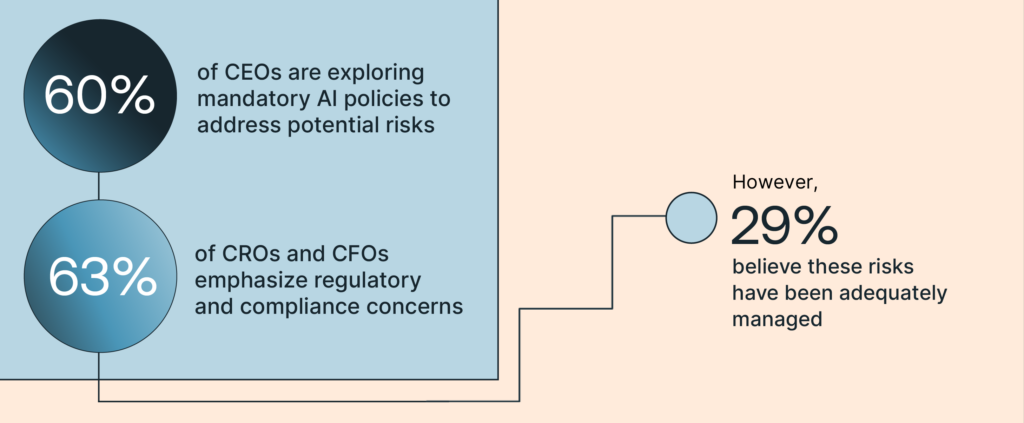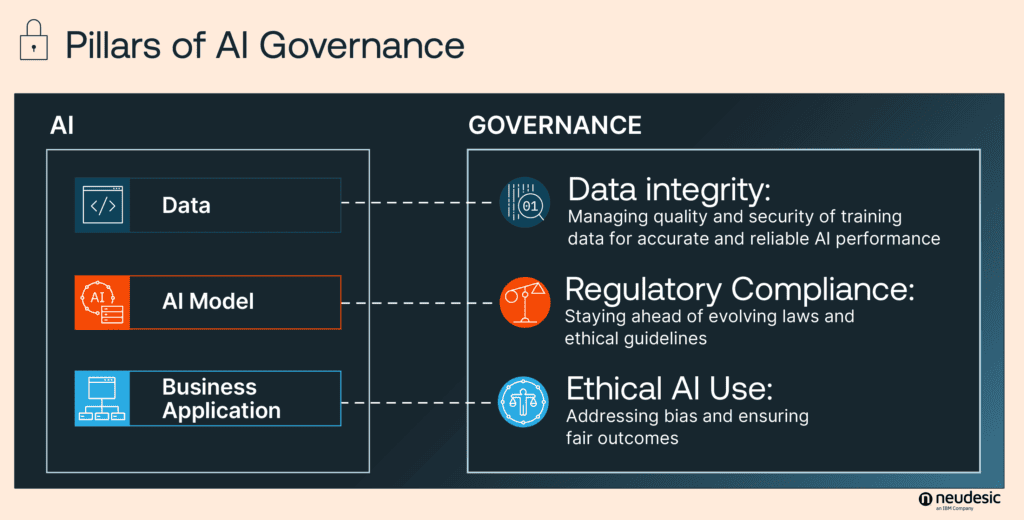


 AI governance is crucial now more than ever as generative AI is increasingly playing a heavier hand in the way businesses innovate, operate, and compete. According to a survey conducted by Authority Hacker, 9 out of 10 organizations view AI as a tool to achieve a competitive advantage over their competitors. From accelerating decision-making to enhancing customer engagement and boosting efficiency in areas like data analysis, its benefits are undeniable.
AI governance is crucial now more than ever as generative AI is increasingly playing a heavier hand in the way businesses innovate, operate, and compete. According to a survey conducted by Authority Hacker, 9 out of 10 organizations view AI as a tool to achieve a competitive advantage over their competitors. From accelerating decision-making to enhancing customer engagement and boosting efficiency in areas like data analysis, its benefits are undeniable.
But alongside these opportunities come new challenges: data integrity, bias, ethical AI issues, and regulatory compliance, to name a few. To thrive in this fast-evolving landscape, organizations need an AI governance framework-a proactive, strategic approach to managing AI’s vast potential while mitigating its risks.
Why is AI Governance Important?
AI governance is the union of policies, practices, and tools that guide the ethical, responsible, and effective use of artificial intelligence within an organization. It ensures that AI technologies are deployed and managed in ways that align with organizational goals, societal values, and regulatory requirements. AI governance adapts and expands traditional data governance principles to address the unique complexities of AI systems. It ensures ethical, secure, and responsible AI use by focusing on three key pillars:
- Ethical AI Use: Using AI systems responsibly and addressing potential harms like bias, discrimination, privacy violations, and lack of transparency in AI decision-making.
- Regulatory Compliance: Staying ahead of evolving laws and industry standards and following relevant laws and ethical guidelines.
- Data integrity: Ensuring that the data used for training and operating AI models is accurate, complete, consistent, and reliable, which is a critical factor for accurate and reliable AI performance.
This modernized approach to AI governance empowers businesses to innovate confidently while remaining accountable and aligned with data privacy, safety, and regulations.
Build Your AI Governance Framework
A successful AI governance framework combines clear strategy, robust policies, and modern tools to create a balanced approach. Here are the 4 steps:
-
Align AI governance framework with business objectives
An effective AI governance framework starts with defining clear objectives. What business goals will AI support? What risks must be mitigated? By aligning governance initiatives with these objectives, organizations can balance the pursuit of innovation with effective risk management. -
Prioritize high-quality data and data integrity
High-quality and well-labeled training and reference data are foundational to AI success, and ensuring data stays that way is one of the primary roles of data governance. Organizations should maintain clean data repositories and enable robust metadata management, particularly for retrieval-augmented generation (RAG) applications. In addition, clear transparency and accountability for data stewardship is essential, ensuring that everyone understands their role in maintaining data integrity. It is also critical to maintain clear, consistent, and usable metadata to ensure that searches and other patterns are as efficient and powerful as possible. -
Adopt AI-specific policies for data stewardship
AI governance frameworks must include tailored policies for AI. These should address model selection, deployment standards, and ongoing monitoring to prevent unintended consequences, such as bias or inaccuracies. These policies ensure that AI systems remain aligned with organizational values and objectives and improve data stewardship. -
Use AI to govern AI
An AI governance framework doesn’t just manage AI; it uses AI to enhance oversight. Tools such as those found in Azure AI Studio and Microsoft’s Azure AI Evaluation’s SDK and Mosaic’s AI Agent Evaluation for automating compliance checks, monitoring risks, and detecting anomalies can streamline governance processes, making them more efficient and scalable.
Overcoming Challenges From Securing Quick Wins

At a Gartner conference, over 65% of data leaders identified data governance as their primary focus for 2024. However, across the C-suite, executives acknowledge the need to improve their AI risk management. 60% of CEOs are exploring mandatory AI policies to address potential risks, and 63% of CROs and CFOs emphasize regulatory and compliance concerns. However, only 29% believe these risks have been adequately managed.
To build momentum, organizations can achieve 3 quick wins:
- Conduct a rapid audit: Identify where and how AI is currently being used and assess associated risks.
- Invest in training: Equip decision-makers with the knowledge needed to manage AI responsibly.
- Start small: Pilot governance frameworks on a limited scale to refine approaches before scaling across the organization.
These quick wins not only address immediate risks but also build confidence and buy-in for more comprehensive governance efforts.
Act Now and Innovate Confidently
The pace of AI innovation is accelerating, and its impact on industries is profound. Organizations that delay implementing AI governance risk falling behind, as competitors leverage AI’s transformative capabilities with greater confidence and control and win the public’s trust. By acting now, businesses can ensure they are not only compliant with current regulations but also prepared for future developments in AI technology and oversight.
Generative AI’s ability to reshape industries is both its greatest strength and its biggest challenge. The complexity of managing AI responsibly requires forward-thinking governance strategies that prioritize innovation without compromising ethical or operational standards.
AI governance is the key to navigating the generative AI era. By building a governance framework that addresses ethical considerations, regulatory requirements, and data integrity, organizations can unlock AI’s potential while mitigating its risks. This approach fosters trust with customers, stakeholders, and regulators, ensuring that AI innovation supports long-term business success. Organizations that lead in this space will not only innovate confidently but also set the standard for AI governance in the years to come.
Related Posts
